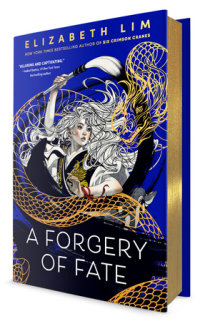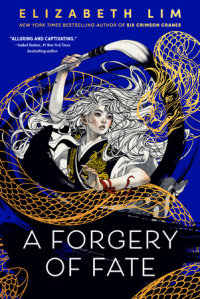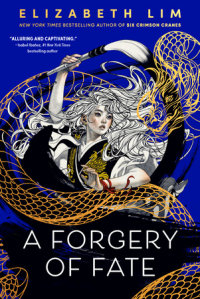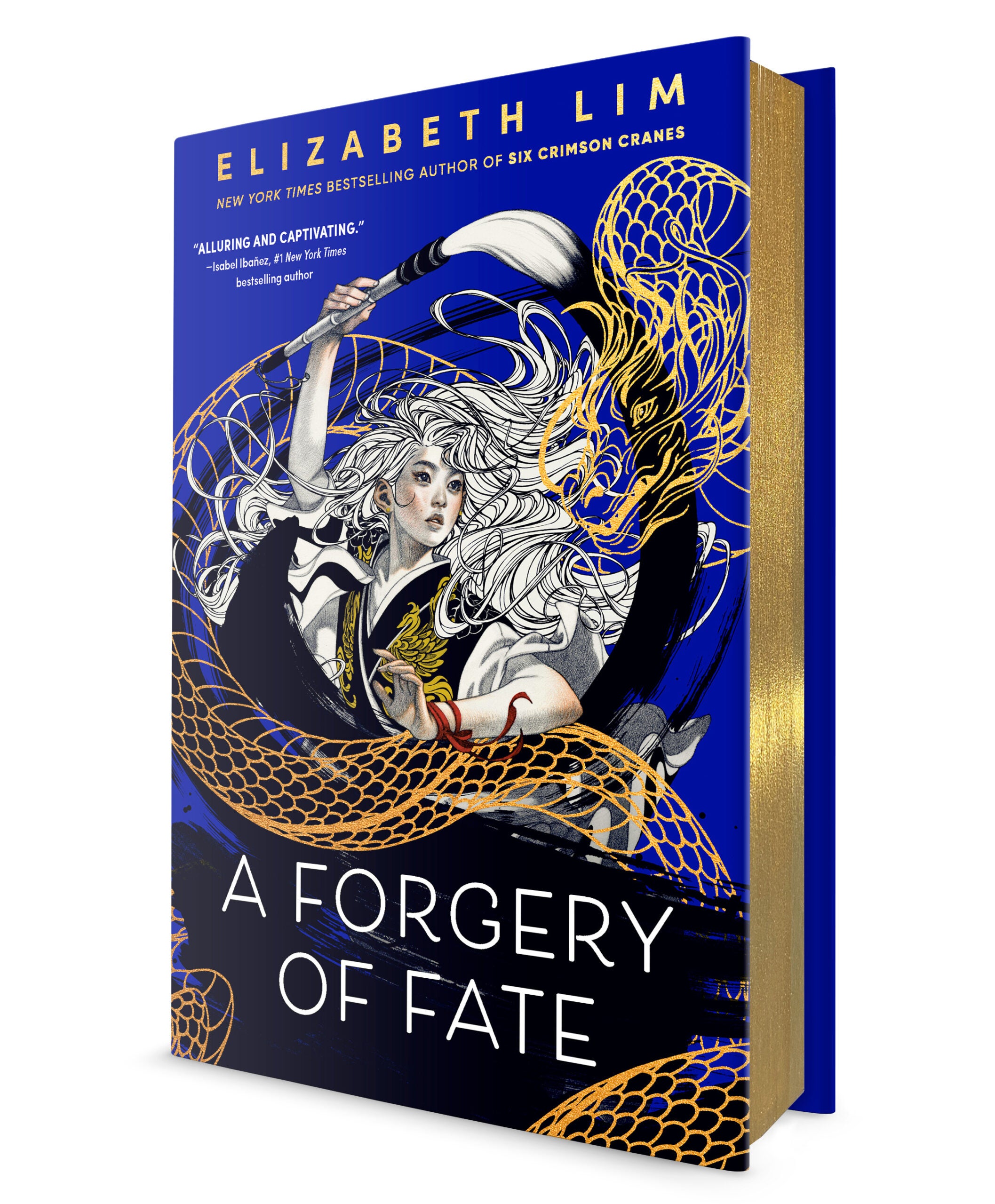A Forgery of Fate
Author Elizabeth Lim




A Forgery of Fate
A breathtaking romantic fantasy inspired by Beauty and the Beast about a girl who paints the future and a cursed dragon lord, bound by love and deception in a plot to bring down the gods.
From the New York Times bestselling author of Six Crimson Cranes!
“Everything I love in a story—danger, complex characters, romance, betrayal and gorgeous writing.” —Mary E. Pearson, New York Times bestselling author of Dance of Thieves
Truyan Saigas didn't choose to become a…
A breathtaking romantic fantasy inspired by Beauty and the Beast about a girl who paints the future and a cursed dragon lord, bound by love and deception in a plot to bring down the gods.
From the New York Times bestselling author of Six Crimson Cranes!
“Everything I love in a story—danger, complex characters, romance, betrayal and gorgeous writing.” —Mary E. Pearson, New York Times bestselling author of Dance of Thieves
Truyan Saigas didn't choose to become a con artist, but after her father is lost at sea, it’s up to her to support her mother and two younger sisters. A gifted art forger, Tru has the unique ability to paint the future, but even such magic is not enough to put her family back together again, or stave off the gangsters demanding payment in blood for her mother’s gambling debts.
Left with few options, Tru agrees to a marriage contract with a mysterious dragon lord. He offers a fresh start for her mother and sisters and elusive answers about her father's disappearance, but in exchange, she must join him in his desolate undersea palace. And she must assist him in a plot to infiltrate the tyrannical Dragon King's inner circle, painting a future so treasonous, it could upend both the mortal and immortal realms. . . .
Devastatingly romantic, with heart-stopping action and twists that kept me turning the pages.
Axie Oh, New York Times bestselling author of The Girl Who Fell Beneath the Sea
Everything I love in a story—danger, complex characters, romance, betrayal and gorgeous writing.
Mary E. Pearson, New York Times bestselling author of Dance of Thieves
An alluring and captivating story, filled with mythical creatures, lyrical prose and vibrant characters.
Isabel Ibañez, #1 New York Times bestselling author of What the River Knows
Devastatingly romantic, with heart-stopping action and twists that kept me turning the pages.
Axie Oh, New York Times bestselling author of The Girl Who Fell Beneath the Sea
Everything I love in a story—danger, complex characters, romance, betrayal and gorgeous writing.
Mary E. Pearson, New York Times bestselling author of Dance of Thieves
An alluring and captivating story, filled with mythical creatures, lyrical prose and vibrant characters.
Isabel Ibañez, #1 New York Times bestselling author of What the River Knows
Devastatingly romantic, with heart-stopping action and twists that kept me turning the pages.
Axie Oh, New York Times bestselling author of The Girl Who Fell Beneath the Sea
Awards & Honors
An Excerpt fromA Forgery of Fate
Mama used to fancy herself the best fortune teller in Gangsun—that is, until Baba disappeared at sea.
Her talent was in reading faces. She could divine someone’s lifespan from the texture of their hair, whether they’d be faithful lovers from the way their mouth slanted. Too often she’d go up to strangers and pinch their earlobes, for that was her way of gauging how prosperous they’d become. Mama loved nothing more than money.
With such a gift, you’d think that Mama would’ve married the richest merchant she could find. Certainly not Baba— a middling trader with blue hair, grand dreams, and nine coppers to his name. But no matter how my sisters and I begged, neither would ever tell the story. All Mama would say, with a sniff, was “Foreign faces are harder to read. Had I known your father would chase adventure over riches—”
“She’d still have picked me,” Baba finished for her one lazy Sunday morning. His eyes twinkled. “Your mother knew from the start what I was.”
“A pirate,” Mama…
Mama used to fancy herself the best fortune teller in Gangsun—that is, until Baba disappeared at sea.
Her talent was in reading faces. She could divine someone’s lifespan from the texture of their hair, whether they’d be faithful lovers from the way their mouth slanted. Too often she’d go up to strangers and pinch their earlobes, for that was her way of gauging how prosperous they’d become. Mama loved nothing more than money.
With such a gift, you’d think that Mama would’ve married the richest merchant she could find. Certainly not Baba— a middling trader with blue hair, grand dreams, and nine coppers to his name. But no matter how my sisters and I begged, neither would ever tell the story. All Mama would say, with a sniff, was “Foreign faces are harder to read. Had I known your father would chase adventure over riches—”
“She’d still have picked me,” Baba finished for her one lazy Sunday morning. His eyes twinkled. “Your mother knew from the start what I was.”
“A pirate,” Mama muttered. “A thief.”
“An adventurer,” I said at the same time as Baba. With a grin, he lowered his voice to a conspiratorial whisper. “And once, in another life, your mama was one too.”
I stared at him, convinced that he was telling tales. I couldn’t imagine my prim mama with her hair down, let alone chasing after bandits or swilling rice wine with sailors.
She saw my skepticism and waved it away. “Those were desperate times. Before I had my three girls.”
I longed to know more, but Baba and Mama exchanged a look that drew the shutters over their past.
Mama picked me up and set me on her lap, her voice softening. “Thankfully, your fate will be different, Tru.” She touched the mole by the right corner of my mouth. “This means you’ll never go hungry, and you’ll have a gift for making coin.”
“Will she have a gift for saving it too?” Baba teased. He eyed the silk shawl draped around Mama’s shoulders and the new bangles at her wrists. “Because her mother certainly doesn’t.”
Mama glared, but her mouth betrayed the smallest of smiles. “Being married to a Balardan makes it harder to earn people’s trust,” she retorted. Her gaze raked over Baba’s hair, which shimmered dark blue under the summer sun. “I need to look presentable in case you scare away all my customers.”
“Your daughter isn’t a customer. She didn’t ask for her fortune to be read.”
“I don’t mind,” I said quickly. “I like it when Mama reads me.”
Back then, it was the truth. I was young and gullible, and no one believed in Mama’s abilities more than I did.
Baba clicked his tongue. When Mama was out of earshot, he leaned down until we were eye to eye and said, “No one can see the future, Tru. Not even your mother.”
“But she says—”
“Mama likes to . . . pretend,” said Baba in his lowest voice.
I frowned. “I don’t understand.”
“You remember that old story about the fish and the dragon?” he asked, instead of explaining. “Fortune finds those who leap, my Tru. Whatever yours is—riches or love or adventure—you make it yourself. Nothing is predetermined. Not by the gods, not by the lines on your palm or the creases on your brow.” He counted my worry lines with his fingers. “Or else these lines mean you’ll have seventeen children.”
That made me giggle.
“See? It’s nonsense.” Baba tousled my hair. Then—as if by magic—he drew out a wooden ship from behind my collar.
“Oh,” I breathed as Baba dropped the ship onto my palm. It was as small as a teacup and still in a rough state, but the smoothly sanded sails and the outline of a magnificent phoenix along the bow gave me glimpses of its potential. “It’s going to be your finest yet.”
“I think so too,” Baba agreed.
Art and the sea, those were what my father loved most, after his family. When he was away, he carved us trinkets of marvels he’d encountered on his travels: monkeys and tigers, shadow puppeteers, bridges cast like crescent moons—my younger sisters and I had an entire collection under our bed. This was the first time he’d shown me something that he was still working on.
“When it’s finished, I want you to paint it for me.”
My eyes went wide. “Me?”
“Yes. Falina says you steal into my cupboard when I’m not here. The one with all my paints and brushes.”
Demon turds, of course she’d given me away. I grumbled to myself, wishing my younger sister had never been born.
I wanted to deny the stealing, but we had a rule in our household, and that was never to lie to family. “I only did it once,” I admitted. “Maybe twice.”
“Why?”
“I was curious. I saw a painting of the Twin River Mountains inside Aunt Lili’s bakery, and they looked like two pears next to each other. She said she bought it for thirty jens.” I waved my arms. “Thirty jens! I wanted to tell her I could draw them better, for twenty.”
“Could you?”
The corners of my mouth twitched into a smile. My pride would be the end of me. “Yes.”
A hearty laugh rumbled out of Baba’s throat. “That’s just what I wanted to hear. Balardans have art in their souls, Tru. I was hoping one of my girls might paint.” He unrolled the leather case he kept on his belt, and his fingers danced across a set of carving knives before they landed on a slender paintbrush. “Here, to get you started.”
I held the brush between two fingers, surprised by its lightness. It was white and pointed, like the tip of a horse’s tail, and the handle was made out of bamboo. I’d seen a dozen like it in the marketplace, but that Baba had bought it for me made it the most special in the world.
“The hair’s made out of weasel,” Baba said, looking a little sheepish. “Not very elegant, still it makes for the sharpest lines. You’ll need that in a magic paintbrush.”
“A magic paintbrush?”
“A game I played when I was a boy. I’d paint anything I could dream up: flying sailboats, birds that could tell stories, and lanterns that never went out.” He leaned forward to whisper conspiratorially, “Then I’d say, ‘Magic paintbrush,’ and they’d all come to life.”
“Truly?” I breathed.
“Well, not truly,” Baba confessed. “It’s a game of imagination. A game where the only rules and limits come from here.” He tapped my forehead.
I exhaled with wonder. “Then how do you know who wins?”
“The best games have no winners or losers.”
I pictured playing with my sisters. All Fal would wish for were dresses and jewels, and Nomi—my thoughts turned tender—she’d want a mountain of books. My youngest sister was a genius; at four years old, she could already read better than Fal and me.
“Use the brush to paint what’s real, or paint what isn’t,” said Baba. “So long as painting it makes you happy, that is the best practice.”
My heart swelled. “Thank you, Baba.”
“My paints are yours now.” He brought the wooden ship forward. “Think about which colors you’ll use on it. One day, if fortune permits, it’ll be a real ship that we’ll sail together.”
“If fortune permits?” I said, raising an eyebrow. “We make our own fortune, remember?”
He laughed. “Indeed, Tru. So we will.”
In the weeks that followed, “magic paintbrush” quickly became my favorite game. Every afternoon, my sisters and I played while Mama read foreheads and destinies in the kitchen.
Nomi adored our games. Fal did too, though she’d never admit it. She’d hover over my shoulder as I brought to life the talking fish and singing trees from Nomi’s stories, casting a critical eye on every stroke. Then at night, we’d squabble over the ship I’d paint for Baba. Fal wanted it to be pink, Nomi purple. In my dreams, it was always blue—like the endless sky over the sea—with phoenix wings that were powered by starlight. As soon as I grew up, I’d sail it with Baba and take on the world.
Little did I know, fortune had other ideas for me.
It started with my hair. Soon after my tenth birthday, it changed color overnight. “Bandit blue,” my mother hissed when she saw. A damning sight anywhere in the city—I might as well have been born with three heads and an extra pair of arms.
Mama was devastated. She sought potions to turn my hair black again, but magic was expensive and hard to come by, so instead she’d make all manner of concoctions for me to drink.
Nothing worked. No tonic, no dye, not even a hat could fully hide the electrifying blue of my hair, and cutting it only made it grow back faster. Secretly, I loved it. Unlike Falina, who’d inherited both Mama’s and Baba’s best features, I wasn’t worth looking at twice except for my hair. The whispers it got aggrieved Fal, who wished she didn’t have anything to do with me. Naturally, that only made me love it more.
By the time I was thirteen, its color was so bold Baba joked that if he could make it into a dye, we’d be rich enough to buy a house on Oyang Street, where only the wealthiest merchants owned manors.
“How can you jest about a thing like this?” lamented Mama. “Her marriage prospects are ruined.”
“Wonderful,” said Baba. “She can come sailing with me.”
Mama stared at him, aghast. “Maybe in Balar, you barbarians would make an adventurer out of a girl, but here—”
“Here in Gangsun, a woman can’t run a business without her husband’s permission,” Baba cut in. “She can’t even own her home. Things will be different for my girls.”
“Yes, they will marry rich,” said Mama, who always had to have the last word.
They didn’t talk about my hair again because, a few days later, Baba announced that he was going away. He had accepted an urgent voyage that would take him halfway across the world. More than that, he couldn’t tell us. But we were used to his secret assignments.
“Will you sail across the Taijin Sea?” Nomi queried while Baba folded his warmest coats into his traveling chest. She had half a fried cruller—leftover from breakfast—in one hand and chomped on it while she spoke. “I hear there’s dragons there. If you see one, will you make friends with it? Promise, Baba. I’d love nothing more than to know a dragon in my lifetime.”
Baba chuckled. “I’ve sailed the Taijin thirteen times, Nomi, and never once have I come across a dragon. But if I do, I’ll certainly send it your tidings.”
“Send it this too.” Nomi reached into Mama’s pan for the last cruller. She inhaled the smell of it with her eyes closed, then presented it to Baba as if it were her greatest prize. “The best friendships are made over food.”
